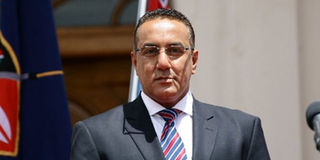Mining firm sues Balala over license

Mining Cabinet Secretary Najib Balala. Cortec Mining-Kenya Ltd told Mr Justice Weldon Korir that the decision to cancel the licence was unlawful and that it would lose $600 billion (Sh53 trillion) in investments.
What you need to know:
- The firm claimed the decision to cancel its licence was “actuated by and based on an ulterior motive.”
A mining company Thursday sued Mining Cabinet Secretary Najib Balala for cancelling its licence.
Cortec Mining-Kenya Ltd told Mr Justice Weldon Korir that the decision to cancel the licence was unlawful and that it would lose $600 billion (Sh53 trillion) in investments.
Revoked licence
The company said it had obtained approval from the National Environmental Management Authority to mine at a cost of Sh13 million.
Other approvals had been given by the Kenya Forest Service and the County Council of Kwale, when the minister revoked the licence, said Cortec-Kenya, adding it had not breached the Mining Act in any way.
The company wants to revoke Mr Balala’s directive since it had been issued with a valid licence on March 7 and that it was about to start mining niobium and rare earth metals.
Justice Korir directed the company’s lawyer, Mr Nelson Havi, to serve the Cabinet Secretary and the Attorney-General.
“Serve the respondents and come back on August 20, for a hearing,” the judge directed Mr Havi.
In a supporting affidavit, Cortec Mining-Kenya managing director David Anderson stated that by August 5, the firm had completed prospecting and exploration in terms of the licences and had identified commercially viable deposits of niobium and rare earth elements at a cost of Sh475 million.
Ulterior motive
He noted that the company had invested nearly half a billion Kenya shillings in the Mrima Hill project (Kwale County), and that the net present value of the mineral resource through exploration stood in excess of $1 billion (Sh88 billion), whereas the in-ground value stood in the excess of $600 billion.
The firm claimed the decision to cancel its licence was “actuated by and based on an ulterior motive.”




